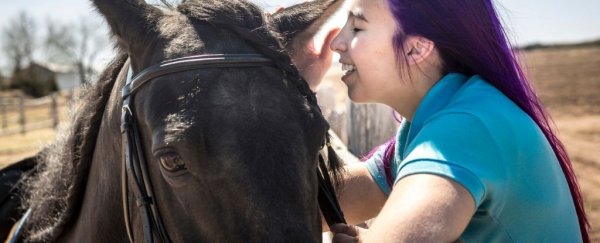Dogs aren't the only animals that can hear the emotion in our voices. According to new research, pigs and horses can also tell the difference between positive and negative expressions in human speech, and it could change how they respond to us.
Previous studies have shown that domesticated horses can read emotions on human faces and hear emotions in human sounds, like growling or laughter.
But this is the first study to compare how domesticated animals discriminate between non-verbal human sounds and sounds from their own species.
The research focused on domesticated pigs and captive wild boars, as well as domesticated horses and captive wild horses from Asia.
All of the animals were played a series of sounds, some of which were from their own species, some of which were from a closely related species and others of which were made by humans.
Each sound recording lasted for a few seconds and expressed some sort of emotional cue, whether positive or negative.
In the end, the authors found all the horses and the domesticated pigs reacted more strongly to negative sounds, irrespective of what animal made them.
After hearing a negative sound from any animal, the horses spent more time walking and less time flicking their tails, suggesting they were being more attentive. The pigs, meanwhile, stood around more and ate less.
Wild boars were the exception. This group of animals did not react differently to positive or negative vocalizations by their own kind or by humans.
The findings are suggestive of a concept known as 'emotional contagion', a primitive form of empathy that is probably quite common across the animal kingdom, allowing people and animals to sense the emotions of others and possibly mirror them.
Within a group-oriented species this sort of behavior would be useful. But researchers think it might occur between species, too. After all, if another animal is crucial for survival, it's worth taking into account their emotions, regardless of whether they're related to you or not.
Domesticated animals fall neatly into this category. Given how much they rely on us for food and shelter, it makes sense our pets and livestock would be in tune with our emotions.
Rodents, sheep, goats, dogs, horses and captive wild animals, like giant pandas and chimpanzees, have all shown the ability to read the expression of emotions on human faces.
Brain scans have also shown horses can discriminate between positive and negative human vocalizations.
"Our results show that these animals are affected by the emotions we charge our voices with when we speak to or are around them," says biologist Elodie Briefer from the University of Copenhagen.
"They react more strongly – generally faster – when they are met with a negatively charged voice, compared to having a positively charged voice played to them first. In certain situations, they even seem to mirror the emotion to which they are exposed."
Interestingly, the authors found that when a negatively charged sound was played first, domesticated pigs and all the horses were immediately put on guard.
When played a positively charged sound, however, the animals were put at ease.
The findings suggest the way we speak to our pets and our livestock could have a larger impact on how the animals act and what they feel than we realize, and it pays to keep that in mind at all times.
"[I[f animals are initially spoken to in a more positive, friendly voice, when met by people, they should react less," explains Briefer.
"They may become calmer and more relaxed."
The study was published in BMC Biology.
